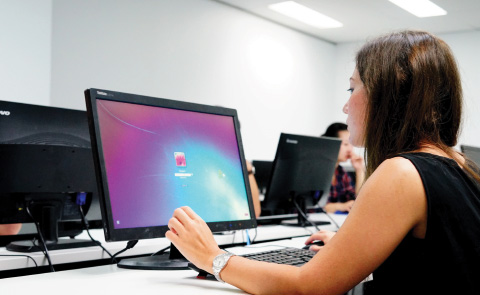Search

Frequently
Asked
Questions
Thinking about studying abroad but have some questions? Our FAQs are here to answer any questions you might have about studying with Lonsdale Institute.
Don’t worry. We are here to help you. You can check “How to start your Lonsdale Journey“
If you are not an Australian citizen you will need to apply for a work or study visa. Check in with your local Australian embassy or consulate well in advance so you don’t have to stress about waiting for approval in the lead up to your flight and start of semester dates. Depending on your chosen course, you might also be asked to meet some other non-academic visa requirements.
One of your visa requirements is proof that you have enough money to support yourself during your studies. Wondering how much money you need to study in Australia? Well, it will depend on where you are going to live, your course, and your education fees. But as a general guideline, the Australian government says you need the equivalent of a return airfare, the fees for your course, and around $18,610 for costs of living such as food and rent in order to be considered for a student visa.
Proof could be in the form of bank statements, loan details, financial aid from the government or university, or information about who is paying for your education. When you are providing proof of your finances, the more information is better. All of your information will be kept safe by the Department of Immigration and Border Protection. The international student department at your university should be able to help you determine if you meet the minimum financial requirements.
It’s almost always easier to seek out the ideal home when you are in your city itself. Still, you can be prepared to a certain degree before arriving in Australia. Research the suburbs and areas that you would like to live in, and check their proximity to your educational institute. You can also check out flat-share websites and Facebook groups to arrange some inspections before you arrive. This is a good idea, as some places in busy cities can get snapped up quickly, especially if they are cheap. It’s also a good idea to arrive a few weeks earlier to get to know the city, get over your jetlag, and decide the best place for you. Try not to make too many concrete plans with accommodation before you can inspect the place yourself – it’s very easy for photos to be deceiving.
Yes, if you love it, you can apply to continue living in Australia. Many people apply for a Temporary Graduate Visa after they get their qualification. You must get a degree-level qualification to be eligible, and there is an assessment process, but there’s also hope you can stay. Your Temporary Graduate Visa can be given for up to two, three or four years.
For further information on studying in Australia, head to the International Students section on the Australian government website. If you’re looking at studying English to enhance your language skills, or are wanting to study something related to business, finance, nursing or project management, make sure to check out our range of courses on offer at Lonsdale Institute.
Yes, you will receive your student card once you have enrolled and arrived on campus.
Most state public transport authorities will not issue you with a student travel concession card.
You’ll first need to fill out an application form
If you indicated the presence of a disability, impairment or long-term condition, please select the area(s) in the following list:
Disability in this context does not include short-term disabling health conditions such as a fractured leg, influenza, or corrected physical conditions such as impaired vision managed by wearing glasses or lenses.
‘11 — Hearing/deaf’
Hearing impairment is used to refer to a person who has an acquired mild, moderate, severe or profound hearing loss after learning to speak, communicates orally and maximises residual hearing with the assistance of amplification. A person who is deaf has a severe or profound hearing loss from, at, or near birth and mainly relies upon vision to communicate, whether through lip reading, gestures, cued speech, finger spelling and/or sign language.
‘12 — Physical’
A physical disability affects the mobility or dexterity of a person and may include a total or partial loss of a part of the body. A physical disability may have existed since birth or may be the result of an accident, illness, or injury suffered later in life; for example, amputation, arthritis, cerebral palsy, multiple sclerosis, muscular dystrophy, paraplegia, quadriplegia or post-polio syndrome.
‘13 — Intellectual’
In general, the term ‘intellectual disability’ is used to refer to low general intellectual functioning and difficulties in adaptive behaviour, both of which conditions were manifested before the person reached the age of 18. It may result from infection before or after birth, trauma during birth, or illness.
‘14 — Learning’
A general term that refers to a heterogeneous group of disorders manifested by significant difficulties in the acquisition and use of listening, speaking, reading, writing, reasoning, or mathematical abilities. These disorders are intrinsic to the individual, presumed to be due to central nervous system dysfunction, and may occur across the life span. Problems in selfregulatory behaviours, social perception, and social interaction may exist with learning disabilities but do not by themselves constitute a learning disability.
‘15 — Mental illness’
Mental illness refers to a cluster of psychological and physiological symptoms that cause a person suffering or distress and which represent a departure from a person’s usual pattern and level of functioning.
‘16 — Acquired brain impairment’
Acquired brain impairment is injury to the brain that results in deterioration in cognitive, physical, emotional or independent functioning. Acquired brain impairment can occur as a result of trauma, hypoxia, infection, tumour, accidents, violence, substance abuse, degenerative neurological diseases or stroke. These impairments may be either temporary or permanent and cause partial or total disability or psychosocial maladjustment.
‘17 — Vision’
This covers a partial loss of sight causing difficulties in seeing, up to and including blindness. This may be present from birth or acquired as a result of disease, illness or injury.
‘18 — Medical condition’
Medical condition is a temporary or permanent condition that may be hereditary, genetically acquired or of unknown origin. The condition may not be obvious or readily identifiable, yet may be mildly or severely debilitating and result in fluctuating levels of wellness and sickness, and/or periods of hospitalisation; for example, HIV/AIDS, cancer, chronic fatigue syndrome, Crohn’s disease, cystic fibrosis, asthma or diabetes.
‘19 — Other’
A disability, impairment or long-term condition which is not suitably described by one or several disability types in combination. Autism spectrum disorders are reported under this category.
Reference: NCVER(National Centre for Vocational Education Research) Standard enrolment questions example form for R8.0
Frequently
Asked
Questions
Thinking about studying abroad but have some questions? Our FAQs are here to answer any questions you might have about studying with Lonsdale Institute.





